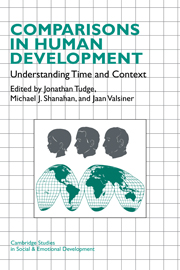Book contents
- Frontmatter
- Contents
- List of Contributors
- Comparisons in Human Development: To Begin a Conversation
- Part One Metatheoretical Approaches to Developmental Comparisons
- Part Two Paradigmatic Statements
- 4 Nested Comparisons in the Study of Historical Change and Individual Adaptation
- 5 The Value of Comparisons in Developmental Psychology
- 6 Implications from Developmental Cross-cultural Research for the Study of Acculturation in Western Civilizations
- Part Three Comparisons at the Level of Data
- Part Four Commentaries
- Author Index
- Subject Index
6 - Implications from Developmental Cross-cultural Research for the Study of Acculturation in Western Civilizations
Published online by Cambridge University Press: 04 May 2010
- Frontmatter
- Contents
- List of Contributors
- Comparisons in Human Development: To Begin a Conversation
- Part One Metatheoretical Approaches to Developmental Comparisons
- Part Two Paradigmatic Statements
- 4 Nested Comparisons in the Study of Historical Change and Individual Adaptation
- 5 The Value of Comparisons in Developmental Psychology
- 6 Implications from Developmental Cross-cultural Research for the Study of Acculturation in Western Civilizations
- Part Three Comparisons at the Level of Data
- Part Four Commentaries
- Author Index
- Subject Index
Summary
Cross–cultural research in developmental psychology has traditionally focused on two areas: cultural comparisons, in which two or more cultural groups are studied and contrasted on variables of interest, and studies of acculturation, in which the focus is the culture change of individuals and groups as two diverse cultures meet. Although at first glance these two areas of study may seem to have little in common, both are concerned with culture, and both are comparative in nature. In this chapter, we first discuss some of the theoretical and methodological issues associated with developmental, cultural comparative research. Second, we explore research in acculturation. Based on research in acculturation with adults, we develop a preliminary model explaining acculturation in children. Finally, we describe a research project currently in progress that is charting the acculturation of Eastern European immigrant children who have recently arrived in a West German community.
Cultural Comparisons in Developmental Psychology
Cultural comparative investigations in developmental psychology have typically been driven by two seemingly opposing purposes: On the one hand, some of these studies have sought to identify universals in human behavior, thus attempting to establish that research results found with one cultural group hold true for other groups. Conversely, other cultural comparative research programs have deliberately sought to identify and explain phenomena that vary across cultures (Berry, Poortinga, Segall, & Dasen, 1992; Triandis, Malpass, & Davidson, 1972). In the section that follows, we outline some of the potential pitfalls associated with cultural comparative investigations.
- Type
- Chapter
- Information
- Comparisons in Human DevelopmentUnderstanding Time and Context, pp. 162 - 190Publisher: Cambridge University PressPrint publication year: 1996
- 1
- Cited by



